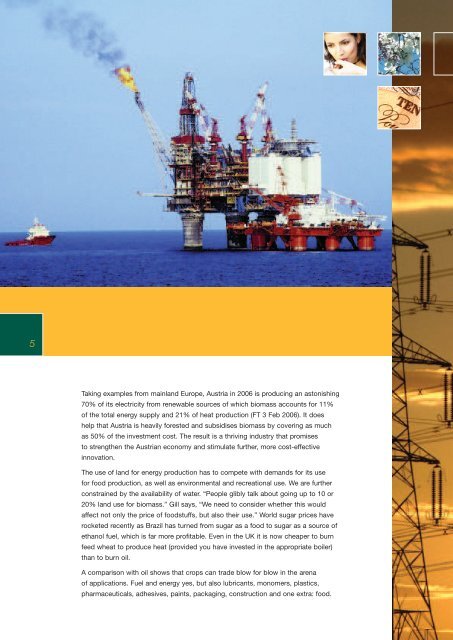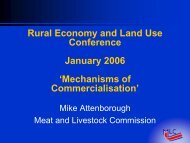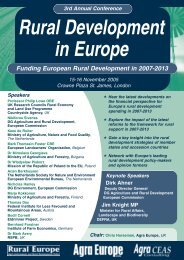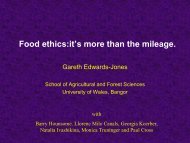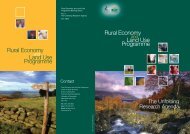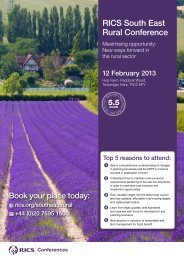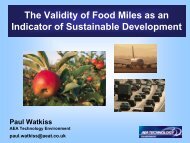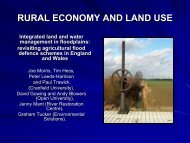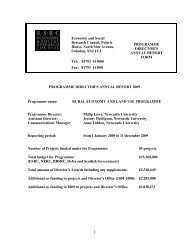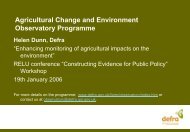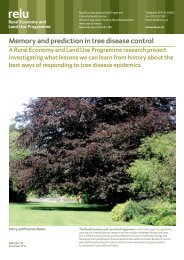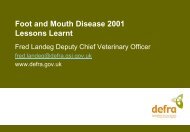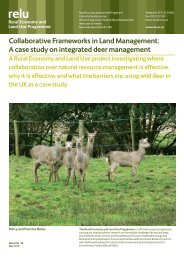Download pdf - Rural Economy and Land Use Programme
Download pdf - Rural Economy and Land Use Programme
Download pdf - Rural Economy and Land Use Programme
Create successful ePaper yourself
Turn your PDF publications into a flip-book with our unique Google optimized e-Paper software.
This leads Professor Lillford to ask “So why isn’t it all<br />
happening One of the problems is, which do you do first<br />
Plant hectares of willow or build the power station Each<br />
faction says you go first.” Another obstacle is the mindset of<br />
chemical engineers who have to design plant. They are used<br />
to oil, or perhaps powders which flow easily. “The idea of<br />
chunks of biomass gives them nightmares,” Lillford says.<br />
This again is where wheat might come in. It does not clog<br />
up the works because it comes in pellets naturally. And it is<br />
economic – at least, it is now because the farmer is subsidised<br />
for growing it. In five years time it may not be, but in the<br />
interim, wheat could be one way of drawing attention to the<br />
advantages of biomass through the building of commercially<br />
viable heat <strong>and</strong> power installations.<br />
Although the government’s emphasis is on electricity<br />
production, biomass does not have to be burned to be useful.<br />
Anaerobic digestion, hydrolysis, pyrolysis <strong>and</strong> gasification<br />
produce chemicals, fuels <strong>and</strong> heat. Where electricity is a<br />
requirement, more efficient conversion rates are achieved<br />
by combined heat <strong>and</strong> power schemes.<br />
“Technology is not the issue; capital investment is,” Lillford<br />
5<br />
Taking examples from mainl<strong>and</strong> Europe, Austria in 2006 is producing an astonishing<br />
70% of its electricity from renewable sources of which biomass accounts for 11%<br />
of the total energy supply <strong>and</strong> 21% of heat production (FT 3 Feb 2006). It does<br />
help that Austria is heavily forested <strong>and</strong> subsidises biomass by covering as much<br />
as 50% of the investment cost. The result is a thriving industry that promises<br />
to strengthen the Austrian economy <strong>and</strong> stimulate further, more cost-effective<br />
innovation.<br />
The use of l<strong>and</strong> for energy production has to compete with dem<strong>and</strong>s for its use<br />
for food production, as well as environmental <strong>and</strong> recreational use. We are further<br />
constrained by the availability of water. “People glibly talk about going up to 10 or<br />
20% l<strong>and</strong> use for biomass.” Gill says, “We need to consider whether this would<br />
affect not only the price of foodstuffs, but also their use.” World sugar prices have<br />
rocketed recently as Brazil has turned from sugar as a food to sugar as a source of<br />
ethanol fuel, which is far more profitable. Even in the UK it is now cheaper to burn<br />
feed wheat to produce heat (provided you have invested in the appropriate boiler)<br />
than to burn oil.<br />
A comparison with oil shows that crops can trade blow for blow in the arena<br />
of applications. Fuel <strong>and</strong> energy yes, but also lubricants, monomers, plastics,<br />
pharmaceuticals, adhesives, paints, packaging, construction <strong>and</strong> one extra: food.<br />
says. If we are to benefit from the energy crop opportunity,<br />
we need a commercial scale pilot plant to demonstrate the<br />
viability of the process, the product performance, <strong>and</strong> market<br />
acceptance. This must be backed by a robust feedstock<br />
supply at full commercial scale. “But we cannot at the outset<br />
rely simply on market forces; the government needs to tilt<br />
the level playing field <strong>and</strong> provide incentives for industry<br />
to adopt renewables as mainstream raw materials, <strong>and</strong><br />
restructure the regulatory framework to increase the benefits<br />
<strong>and</strong> reduce waste.”<br />
Meanwhile, we need to change our mindset. When the<br />
Swedes start a new building complex, they begin by building<br />
a biomass heat <strong>and</strong> power plant, <strong>and</strong> only then proceed with<br />
as many houses as the power plant will supply. On the other<br />
h<strong>and</strong>, in their quest to curtail their dependence on oil, there are<br />
plans for the UK to import ethanol from Brazil. This is certainly<br />
economic, but should we be concerned about the wider<br />
environmental impacts of bioethanol production in Brazil<br />
As is typical with many of the issues with which RELU is<br />
actively engaged, nothing is simple <strong>and</strong> straightforward, but<br />
RELU is now ensuring for the first time that all the relevant<br />
factors, disciplines <strong>and</strong> interests are explored <strong>and</strong> mapped<br />
out in detail. Then there will be no excuse if they are not taken<br />
into account when decisions have to be made.<br />
6


